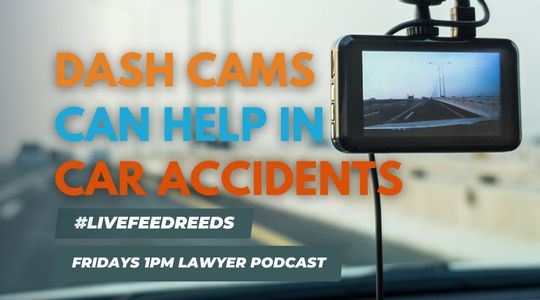Being involved in a car crash can be a traumatic experience; however, sometimes the legal process required to pursue compensation from the at-fault party that occurs after an accident can be even more frustrating. This is particularly true if the issue of fault comes down to your version of the accident versus the other driver’s version of the crash. When that is the case, having a dash cam that provides video evidence supporting your version of the collision can be invaluable.
How Can a Dash Cam Help in an Accident?
The role dash cam video can play in a collision is highlighted by attorney Paul Reed during one of his recent podcasts. A collision occurred right outside the Reed and Reed office and was captured on the door camera. The crash involved two vehicles making a left turn at an intersection. The intersection had a double turn lane, meaning two cars could make the turn simultaneously. One vehicle, however, drifted into the inner turn lane instead of staying in the outside turn lane after completing the turn, causing her to strike a vehicle in the inner turn lane. The driver who made the illegal lane change was clearly at fault but refused to admit that she made an improper lane change. Although that accident did not cause any physical injuries and only resulted in minor damage to the involved vehicles, the fact that it was captured on video will save both parties and their insurance companies a considerable amount of time and trouble that might otherwise be wasted trying to prove who was at fault.
Listen to Paul and Jason discuss this case on the LiveFeedReed podcast

Does Florida Allow Dash Cam Video Evidence?
Florida is a two-party consent state when it comes to recording private conversations; however, video evidence obtained from a dash cam may be admissible if it meets a few basic requirements. First and foremost, the video must be relevant. In a personal injury lawsuit based on a motor vehicle collision video that shows the accident as it occurred would certainly be deemed relevant to the issue of fault. In addition, the video must not include sound that records private conversations (unless both parties consented to the recording) and the video must be recorded on public streets or spaces. The video should be unedited, and you will need to prove the chain of custody for the video to be admitted into evidence in a trial. The best way to ensure that dash cam evidence of an accident is admissible in court is to consult with an experienced car accident attorney immediately after the accident. Your car accident attorney can take possession of the video and preserve it for trial.
If you have additional questions or concerns about how dash cam video can help you pursue compensation for injuries sustained in a Florida car accident, contact the car accident attorneys at Reed & Reed.
